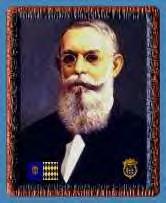Dr. Cayetano Coll y Toste was a Puerto Rican historian and writer. He was born in 1850 in Arecibo, PR., and died in 1930 in Madrid, Spain. [1] “Colón en Puerto Rico”, was published in 1893.
The book begins with a discussion of the primary sources of Columbus’ discovery of Puerto Rico (PR) during his second voyage in 1493. One source example is a letter from Dr. Diego Alvarez Chanca, which is published in full in one of the chapters.
Toste studied the claims of several scholars about Puerto Rico’s discovery. For example, he added a table of comparison between two scholars: Fray Nazario, and Mr. Lugares, who both discussed the chronological timeline and the order of places Columbus visited on this second voyage.
Another chapter is dedicated to Juan de la Cosa, who accompanied Columbus on the first and second voyage. Toste affirms that the existing map from La Cosa is authentic and it included PR with exactitude. Juan de la Cosa later accompanied Amerigo Vespucci, reaching South America with Columbus’ map. Toste defends La Cosa from claims that he was a traitor (to Columbus) for being with Vespucci and not with Columbus during that voyage.
Toste then discusses the Indigenous name of Puerto Rico, Borinquen, and how it’s spelling evolved through the time. Here is a sample of his list:
Buriquén: Chanca (1493), Oviedo (1535), Las Casas (1550).
Boriquén (without “n”): Juan de Castellanos (1589), Antonio de Herrera (1601), Juan de Laet (1640), etc.
Borinquén (with “n”): Fray Iñigo Abbad (1788).
Borinquen: Juan Bautista Muñoz (1793), Washinton Irwing (1828) and Alejandro Tapia (1854).
Toste added Salvador Brau’s own list of Borinquen’s name spelling evolution. Toste then proceeds to define “Bo-ri-quen”:
“Bo” means “Grande” or “Señor” (Great or Lord). Examples of “bo” would be the name of Caona-bó, who was a chief in Hispaniola. His name means “Señor del oro” (Lord of gold). Another chief was Bo-hechio, meanig “Señor del gran territorio” (Lord of the great territory). There was a place named Bo-nao, meaning, “Lugar montañoso del señor” (Mountain place of the lord). Jo-bo is a fruit that people eat in PR and it means “gran árbol” (great tree).
“Ri” means “valor” (valour, courage, bravery). “Ri” is inserted in the names of several chiefs, including Guacanaga-rí and Gua-ri-onex. It’s also in the name of the tribe of cannibals known as Ca-ri-be (Caribs).
“Quen” means “land.” Examples are Bie-que (or Vieques, an islet in PR) which means “tierra pequeña” (small land). Si-que-o is the name of another islet in PR, today known as “Desheo.”
Therefore, Borinquen means “Tierras del Valiente Señor” or “Lands of the Brave Lord.” Toste noted that even though the natives of PR were not warlike people like the Caribs, they were bold in defending themselves.
Puerto Rico was named “San Juan Bautista” (St. John the Baptist) by Columbus.
Toste has a chapter on the Caribs. One of the reasons is because 19th century scholar, Martín Fernández de Navarrete, mistakenly called Puerto Rico, “Caribe” island. Toste discussed the different opinions from scholars about where the Caribs came from. Assertions made by Indigenous tribes are included, like the Achaguas from Colombia, who believed the Caribs were descendants of the tigers (the animal). To them, that explained why the Caribs were cruel.
Toste added a list of the original Indigenous names of the islands discovered by Columbus, and their present-day names.
Toste joined the scholars' debate on where Columbus landed in PR in 1493. We know Columbus landed at the east of the island; but, was it in the town of Aguada, Aguadilla, Mayagüez? That is unclear.
Toste studied a few more Indigenous words, like “Ma,” for Mayagüez (a town in PR). Depending on the context, it also means “great” or “abundance.” Examples would be:
Ma-mey, which is a great tree and another fruit eaten in PR. The Ma-natí (manatee), is a great fish, and I would add here that there is a municipality in PR named “Manatí," after the marine mammal. Ma-cagua, is a great tree in Cuba. etc.
Toste ends his book by confirming that Caparra was the first settlement in PR in1508. Founded by Juan Ponce de León, who was the first Governor of the island.



